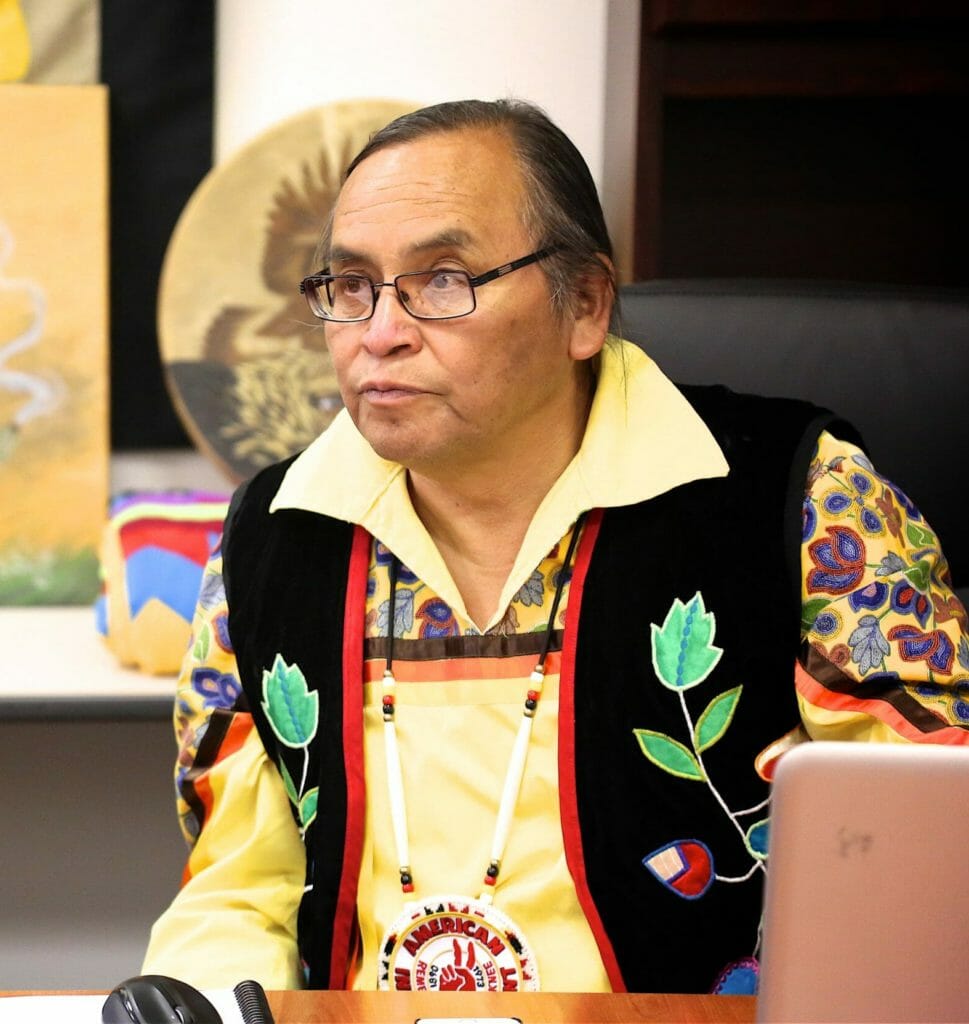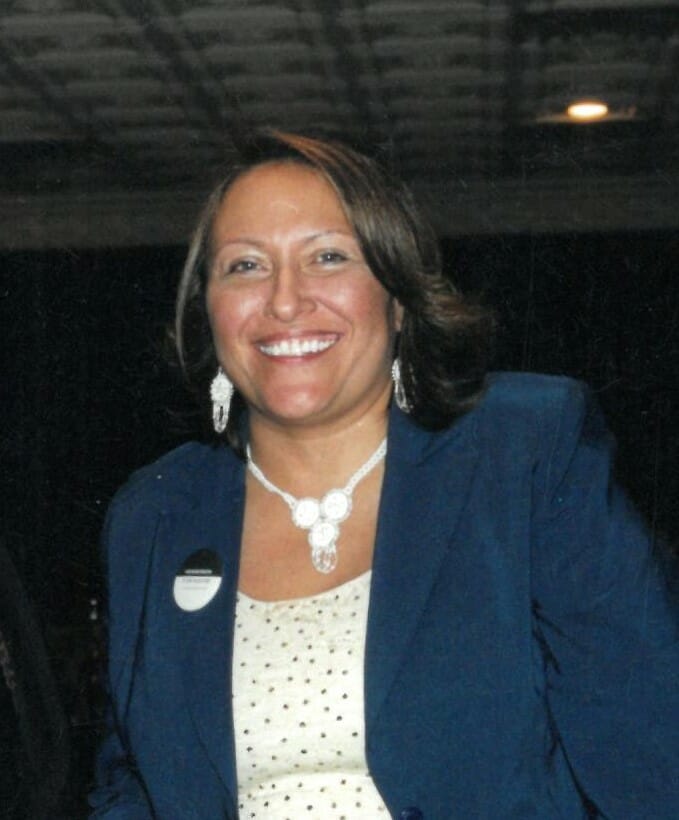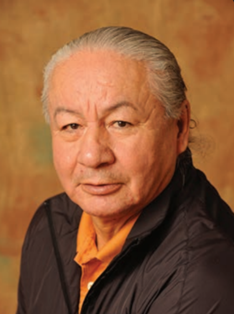Grand Chief Jerry Daniels, 2017 – Present

Grand Chief Daniels is a proud member of Long Plain First Nation and a proud father to Angelo Daniels. He was raised by his grandparents, Isabel and Donald Daniels, along with his aunties, uncles, and community members. In January of 2020, he was acclaimed for a second term, the first time a Grand Chief has run unopposed in SCO’s history. Grand Chief Daniels is focused on improving the quality of life for the Anishnaabe and Dakota Nations. He is a strong and consistent voice on First Nation rights, speaking out against ongoing colonization, all forms of systemic and structural racism, and violence against Indigenous women, girls, and 2SLGBTQQIA, and in support of Survivors of residential and day schools and economic development. He believes that the voices of Elders and youth must be heard, and under his leadership SCO created Elders Committees to advise key program areas and a strong Youth Council.
Read more about Grand Chief Daniels here.
Grand Chief Terrance Nelson, 2014 – 2017

Hailing from Roseau River Anishinabe First Nation, Terrance Nelson was elected for five consecutive terms as Roseau River Chief and has held a role as a Canadian leader for the American Indian Movement. In 2011, he settled a land claim that had been rejected three times prior to his election as Chief. Roseau River set precedent when it was paid over $80 million for 8,000 acres, a price two and a half times larger per acre than the previous largest settlement. He has written numerous books, articles, and papers on economics and First Nation sovereignty, and has accomplished his goals by pushing for Treaty Land Entitlement, urban reserves, health centres, and First Nation economic development opportunities. Terrance Nelson is currently a counsellor for Roseau River Chief and Council.
Grand Chief Murray Clearsky, 2012 – 2014
Murray Clearsky has spent about 30 years as Chief in his home community of Waywayseecappo First Nation. As Chief, he recently saw the completion of a land settlement worth $287.6 million, with 92 percent of eligible voters voting in favour of the settlement. As Chief, Clearsky has focused on improving his community’s access to health, education, and economic opportunities, including working with Assiniboine Community College to deliver a Comprehensive Health Care Aide certificate program for Waywayseecappo community members, and purchasing a plot of land on the outskirts of Brandon, to be developed as the First Nation sees fit.

Grand Chief Morris J. Swan Shannacappo, 2007 – 2012
Morris J. Swan Shannacappo is from Rolling River First Nation. He was Chief there for nearly ten years before being elected Grand Chief of SCO in 2007, serving for two terms in the Grand Chief’s Office. Growing up in Rolling River, he was heavily involved in tourism developments prior to becoming Chief. The Anishinaabe Village project in Riding Mountain National Park earned international recognition, winning the 1997 To-Do Award for Culturally Responsible Tourism, an award given annually by Studienkries in Germany at the one of the world’s largest tradeshows, ATB. When he was Chief, Rolling River earned a top 10 placement nationally in terms of financial management. Swan Shannacappo is deeply involved in Indigenous spirituality, traditions, and visits many first Nations to attend Pow-wows.

Grand Chief Chris Henderson, 2004 – 2007

Chris Henderson is Anishinaabe and a First Nations member of the Black River First Nation (signatory to Treaty No. 5), and a former band member of the Sapotaweyak Cree Nation (signatory to Treaty No. 4). During his term as Grand Chief, he commissioned a comparative analysis of the TLE implementation processes in Saskatchewan and Manitoba to draw attention to the slow pace of the reserve creation process in Manitoba under the TLE Framework Agreement. As a result of this report, Canada and Manitoba later both declared they were committed to accelerating the TLE land conversion process in Manitoba. Prior to his appointment as Executive Director of the Treaty Land Entitlement Committee of Manitoba, he served as Project Manager with the Government of Manitoba’s Aboriginal Issues Committee of Cabinet, providing policy analysis and advice to various Cabinet Ministers on a variety of issues and challenges facing First Nations in Manitoba.
Grand Chief Margaret Swan, 2000 – 2004

Margaret Swan was born in Winnipeg and spent her childhood and youth living on the Lake Manitoba First Nation. As a young woman she was in the military and later spent time working in various roles with First Nations and First Nation organizations. She began her career in Portage la Prairie working as a social worker with Dakota Ojibway Child and Family Services and Sandy Bay CFS. She then went on to become Chief of Lake Manitoba First Nation, prior to being elected as Grand Chief of SCO. She has also worked coordinating long-term planning for foster care at the Ma Mawi Wi Chi Itata Centre Inc. in Winnipeg. She is fluent in Ojibway and considers herself a spiritual person who takes part in both Traditional ceremonies and Christian church. Swan was pivotal in moving the Indian Day School Class Action Lawsuit Settlements through to reality, advocating to see that historic day happen in August 2019. She is currently Director of CFS for SCO, and sits as Chair of the Board of the Southern First Nations Network of Care.
Grand Chief Bill Traverse, 1998 – 2000
With over 30 years of experience in First Nation politics, Bill Traverse was born in Dauphin River, and as a child moved to the Kinonjeoshtegon First Nation (then known by its English name, Jackhead). He went to residential school in Portage la Prairie and spent time in the Army Reserves, where he showed talent for the military life. However, he chose other work instead and held several occupations prior to returning to Jackhead as a young man, where he became Chief. Serving for nine terms (18 years), regular meetings were held with Elders while he was Chief. After his time as Chief of Kinonjeoshtegon First Nation, he was instrumental in the creation of SCO, and became the organization’s first Grand Chief. Since being Grand Chief of SCO, Traverse has worked as a political advisor for Assembly of Manitoba Chiefs, and later was the Regional Chief of Manitoba for the Assembly of First Nations, and an elected member of the AFN Executive Committee from 2009 until 2015.


